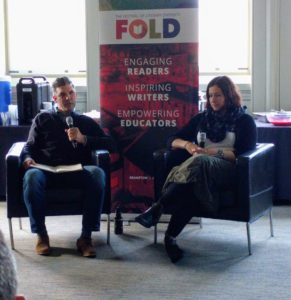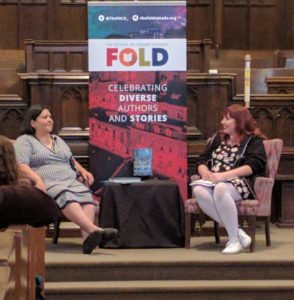May 4-7 marked the second Festival of Literary Diversity in Brampton, Ontario.
There aren’t many things that make me give up a weekend of relaxing at home, but the Festival of Literary Diversity is one of them. The FOLD, for those of you who haven’t had the pleasure of hearing about it before, is a festival dedicated to celebrating authors and stories that are underrepresented. It was founded by author Jael Richardson and began last year. I found out about it through Ryerson University’s publishing program. Since I follow #WeNeedDiverseBooks and have a personal goal to broaden my literary horizons, I volunteered despite the distance between Ottawa and Brampton. And honestly, I had such a good time there in 2016 that I knew I’d want to do it again. Luckily, the literary odds were in my favour and I happened to be available May 6 and 7 for the weekend portion of the festival.
Saturday
FOLD volunteers get free access to the panels, interviews, and workshops in exchange for completing a few volunteer shifts during the festival. So, I arrived at Peel Art Gallery Museum and Archives (PAMA) early in the morning on Saturday for my shift as a greeter. A few hours of directing people to accessible parking and giving out festival information later and I was free to attend an afternoon full of fantastic panels.
Fabulous Fiction
The first panel I sat in on was about fiction and featured four authors – Adwoa Badoe (Aluta), Monia Mazigh (Hope Has Two Daughters), Saleema Nawaz (Bone and Bread), and Gary Barwin (Yiddish for Pirates) – moderated by Daniel Bezalel Richardsen, editor of the literary journal Foment.
The authors began by reading from their respective novels, which is always a treat. While all chose passages that captured the attention and left you wanting more, I was particularly enchanted by Barwin’s reading. He was so animated, and it was impossible not to smile at his pirate voices.
Richardsen then lead the authors into discussions about writing processes, inspiration, and language (all of the authors include languages other than English and French in their works). One of the coolest parts of these discussions was their exploration of the power of fiction. Badoe and Mazigh both explained that fiction is a way to break silences and explore topics not taught in school or addressed by governments, while Barwin and Saleema talked about the cyclical nature of exploring the past through writing.
Altogether, it was a really fun and thought-provoking panel. But the best part? I found four new books I want to read (luckily the FOLD bookstore – run by BookLore – accepted credit card).
The Role of Writers in Times of Trouble
There’s a lot going on in the world right now that made this panel seem relevant. Globe and Mail journalist Denise Balkissoon led journalists and authors Scaachi Koul, Leah Lakshmi, Hayden King, and Kamal Al Solaylee in a discussion on how and if writers can make a difference.
“Books last forever when they’re not burnt.” – Leah Lakshmi Piepzna-Samarasinha #FOLD2017
— The FOLD (@TheFOLD_) May 6, 2017
These panelists didn’t shy away from acknowledging negative aspects of society, Koul being the most forthright by announcing that “everything is garbage” at the beginning of the conversation. They talked about all kinds of intolerance (sadly, all of these panelists have experienced hate mail in response to their work—and sometimes it seems, just for existing in the first place) and how their writing addresses it. One thing they all shared was a sense that they had responsibilities thrust upon them to represent and “speak for” the diverse groups to which they belong – a responsibility that isn’t fair.
The discussion eventually turned to how they maintain their journalistic presences while not becoming overwhelmed by all the negative news that has been happening lately. I was somewhat surprised to find that they all – despite writing for a living and in at least Koul’s case, working on the internet – limited their media consumption in some way.
I had intended to live tweet this panel. But shortly after the discussions began, I felt it was more important for me to sit and listen. I have a certain amount of privilege as a white, cis-gendered, straight person, so it was good for me to hear different perspectives.
Despite all the troubling things discussed in this panel, the speakers maintained a certain level of humour throughout and maybe even a little optimism. As Koul said, “everything is garbage, but at least there’s acknowledgment now.”
The Writers’ Court
Despite being pretty tired after the Times of Trouble panel (I’d been up since 5:45 am, after all), I decided to stick around for one more event: The Writers’ Court.
This is an event that that puts writers in the spotlight in front of publishing professionals. I didn’t know what to expect from this event, since anyone was permitted to apply to be a part of it, but after seeing it I’m convinced it’s one of the most unique festival events I’ve ever been to.
The writers, who’d submitted work to the FOLD board in advance, got up in front of the audience in the PAMA courtroom and read excerpts from their novels in progress. There was a mix of genres and styles, but all of the readers had unique ideas. I have so much respect for them and it was really cool to hear the feedback from the publishing folks. Their advice ranged from the fairly standard like reading your work aloud to edit it and considering your audience to more specific comments on titles and line corrections. As someone who studies publishing, this was a particularly worthwhile event.
Sunday
I volunteered for the morning shift on Sunday as well, this time primarily because I wanted to be present at the author breakfast. I helped set up and check people in and then got to sit back and listen.
Breakfast with Katherena Vermette
Like just about anyone who follows Canadian Literature, I’d heard about Katherena Vermette. Her novel, The Break, was in this year’s Canada Reads contest so I was ready for a great conversation between her and Hayden King. And I wasn’t disappointed.

Like all of the panels at the FOLD, there was an acknowledgement of the Indigenous land on which PAMA stands. This transitioned well into a discussion about the Native stories that inspired parts of Vermette’s novel. From there, she and King discussed the difficulties of writing about hardships and the importance of writing about resilience.
Vermette answered all of King’s questions in a thoughtful way. She seemed very informed and, despite acknowledging the many inequalities Indigenous peoples and Indigenous women in particular face, she continually acknowledged that things are getting better. For instance, she shared her excitement about not being the only Native woman getting attention in the literary world.
One of my favourites parts of this discussion was King and Vermette discussing what makes literature Canadian. The discussion can be condensed to a single exchange between the two: Hayden admitted he didn’t know how to define Canadian lit, and without hesitation, Vermette responded, “it’s best not to.”
The Writers’ Hub
The breakfast was the last event at PAMA, so I moved on to City Hall to see what was happening there. I caught the tail end of a panel in which publishing professionals in sales, marketing, and publicity shared strategies for improving the visibility of stories by diverse writers, before entering Writers’ Hub.
This event was set up as a marketplace for writers to discuss submissions with various publishers (both journals and books). While I didn’t really have any new writing to discuss, I still chatted with publishers, learning about how the representatives got into the publishing industry and what kind of things they looked for in submissions. Though by this point in the weekend I’d had a lot of interaction and was feeling a bit drained, I still had a good time. Plus I got some swag to add to the goodies I’d collected throughout the weekend.
The Last Lecture with Eden Robinson
The first thing I heard from the other volunteers when I arrived on Saturday was that Eden Robinson had the best laugh. I kept hearing good things about her throughout the weekend and this was enough for me to buy Son of A Trickster and to delay my departure long enough to see this final event. Once more, I wasn’t disappointed.

Eden Robinson is an absolute delight. She talked about being Haisla/Heilstsuk and her family – how they want her to represent both cultures and aren’t afraid to give her their feedback. She explained Potlatch culture and how story telling is important among Indiginous people, and how both are changing. She also read from Son of A Trickster, the first book in a trilogy that FOLD founder Jael Richardson described as “proving Canadian literature isn’t boring.”
She was funny and full of energy, and – just as everyone said – she has a lovely laugh. I was lucky enough to get my copy of Son of a Trickster Signed and I know I’ll be thinking of the FOLD when I get around to reading it.
Take Aways
What The FOLD continues to teach me is that including different voices shouldn’t be an afterthought, nor should those voices be confined to discussing diversity. Too often you see diversity panels at festivals or conventions that are the only times multiple minorities are represented together. While discussions of diversity are certainly important, one of the cool things about the FOLD is that the authors get to talk about more than that. During the weekend, I heard talks about genre, storytelling, language, fiction, the media, politics, and more. Since all the authors come from underrepresented groups, they don’t have to stand as the token minority. That means, they can spend more time talking about story and sharing their specific experiences.
Another cool thing that The FOLD demonstrates is how to make a space welcoming and accessible. Since The FOLD strives to not only showcase diverse authors, but also to ensure that the same diversity is mirrored in its audience, the organizers made sure their locations were set up so everyone could take advantage of their programming. Aside from ensuring the locations were accessible, they even redesignated some of that bathrooms to be gender neutral. Altogether, it makes for a really welcoming and inclusive environment.

Though attending the festival is well worth the trip, I had a particularly good time being a volunteer. I got to see the background work that goes into making it all happen (not to mention hanging out in the green room with authors) and experience it all like an attendee. The FOLD team is fantastic, always nice and super appreciative of the volunteers (as were many of the guests). It’s clear they have passion and dedication, and I think that’s what helps makes this festival successful. It’s only the FOLD’s second year, but I feel and I sincerely hope that it continues to grow.


